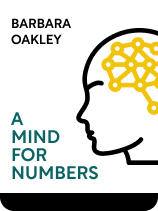

This article is an excerpt from the Shortform book guide to "A Mind for Numbers" by Barbara Oakley. Shortform has the world's best summaries and analyses of books you should be reading.
Like this article? Sign up for a free trial here .
What is active recall studying? How might this method help you learn and remember almost anything?
Active recall is the act of retrieving information from your memory to deliberately strengthen the neural pathways to it—making sure that it stays accessible in your memory. Author Barbara Oakley asserts that, of all the common study methods that have been researched, active recall studying is the most effective.
Read more to learn about active recall studying and how it can help you learn.
Effective Repetition Is Key to Learning
Your brain has natural processes for clearing information from your working memory. Thus, Oakley warns that even a memorable fact may soon become unretrievable if you don’t review it. According to Oakley, repetition helps to ensure that your brain recognizes facts as important and stores them in long-term memory. Active recall studying is one of several strategies for effective repetition.
| How does your brain differentiate between trivial information to purge and important information to save? At present, we don’t know: As Joshua Foer points out in Moonwalking with Einstein, scientists can measure which parts of the brain are more active during prescribed activities, but they have not yet been able to determine how memories are stored in your brain, or how human thought actually works. Someday, if scientists solve this mystery, we may discover new and more efficient ways of flagging certain memories for retention and others for deletion. But until then, we must rely on the tried-and-true, if somewhat old-fashioned method of recalling information over and over again to cement it in our memories. |
Test Yourself With Active Recall Studying
According to Oakley, every time you recall something from memory, your brain’s retrieval process strengthens the neural pathways to that chunk of information. Active recall is the act of retrieving information from memory to deliberately strengthen the neural pathways to it and thereby ensure that it remains accessible in your memory. Oakley asserts that of all the common study methods that have been researched, active recall studying is the most effective.
Why does active recall studying work? Oakley references a study by Jeffrey Karpicke, which argues that “active retrieval practice,” or active recall, refines the knowledge that you recall, making it more meaningful, as well as more easily retrievable in the future. Karpicke goes on to assert that active recall is under-valued and under-utilized because its benefits are not sufficiently well known.
In explaining the basis for active recall studying, Oakley also brings up the “testing effect:” You are more likely to remember something you have learned if you are tested on it. She points out that when you practice active recall, you are basically testing yourself, so active recall allows you to take advantage of the testing effect in your own study.
(Shortform note: The connection between active recall studying and the testing effect seems to be widely accepted in psychological studies, or rather, there is little distinction between the testing effect and active recall in these studies. This is because experimental studies typically use tests to standardize recall practice. Karpicke states that recall activities do not need to look like tests to be effective. However, in the study he cites to exemplify this, students were asked to write down as many ideas as they could recall either as paragraphs or concept maps. In practice, this still looks a lot like an essay-format test without feedback.)
In her discussion of the testing effect, Oakley asserts that even if you do poorly on the test or don’t know how you did because you didn’t get any feedback, you still remember more than if you aren’t tested at all. (Shortform note: Oakley is probably referring to the results of a study that described a “pre-test effect,” in which students who gave incorrect answers on a pre-test did better on subsequent tests than students who did not take a pre-test.)
| Active Recall Studying: Present and Past Academic Interest A few years after Oakley published A Mind for Numbers, Karpicke compiled a report on recent progress in retrieval-based learning studies. He reported that between 2005 and 2015, the number of papers on the subject had increased ten-fold. Based on his synthesis, the results from all this new research continued to support the claim that active recall is the most effective method of studying, regardless of the subject being studied or the method of testing. However, despite this recent surge of interest, active recall is not a new idea. Over a hundred years ago, William James wrote that active repetition, that is, recalling information from memory, is more effective for learning than methods of passive repetition, such as rereading the material. |
Practicing Active Recall
How should you practice active recall studying? Oakley suggests that if you just finished a reading assignment, close the book and try to recall the essence of what you just read. Later on, if you’re reviewing the material, try to recall it from memory before you open the book.
| Additional Methods of Practicing Active Recall In Ultralearning, Scott Young presents some additional methods for practicing active recall: Flashcards: Write a question on one side and an answer on the other. Try to answer the questions from memory before looking at the answer. Free recall: Take a blank sheet of paper and try to write out the material you’re studying from memory, without referring to your textbook or other resources. Question taking: When taking notes, write them in the form of questions that you have to answer from memory. For example, when you learn about matrix multiplication in math class, instead of writing out the whole process, just write, “How do you multiply two matrices?” Then, when you review your notes, you have to recall the information from memory. Self-assigned challenges: Identify a task that you should be able to complete once you’ve mastered the material you are learning, and try to complete it. For example, if you’re taking a class in computer science, try to create your own flash-card app that you can use in your other classes. |

———End of Preview———
Like what you just read? Read the rest of the world's best book summary and analysis of Barbara Oakley's "A Mind for Numbers" at Shortform .
Here's what you'll find in our full A Mind for Numbers summary :
- How to make math and science intuitive
- Strategies for remembering complex concepts more easily
- How to build good study habits and avoid procrastination






